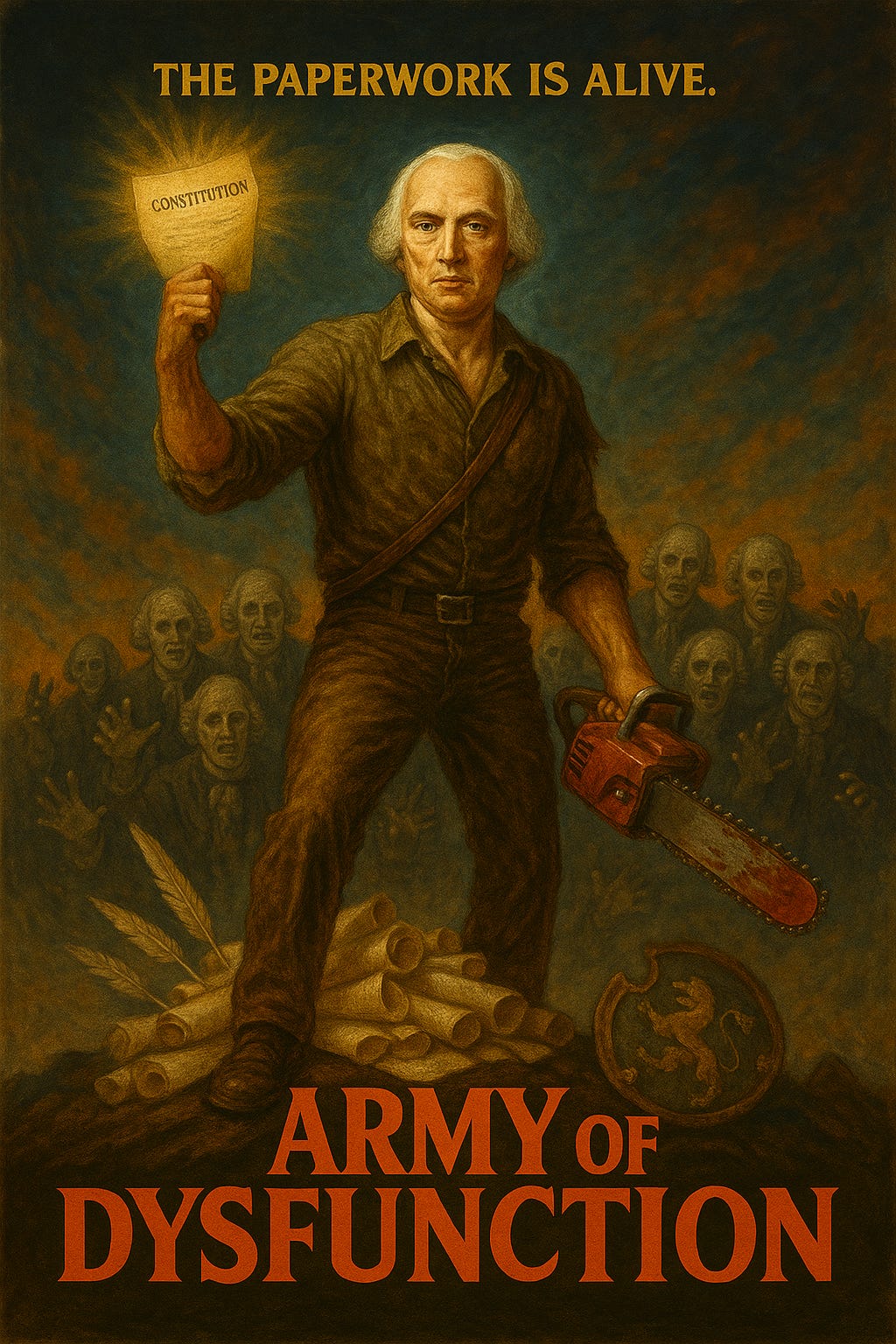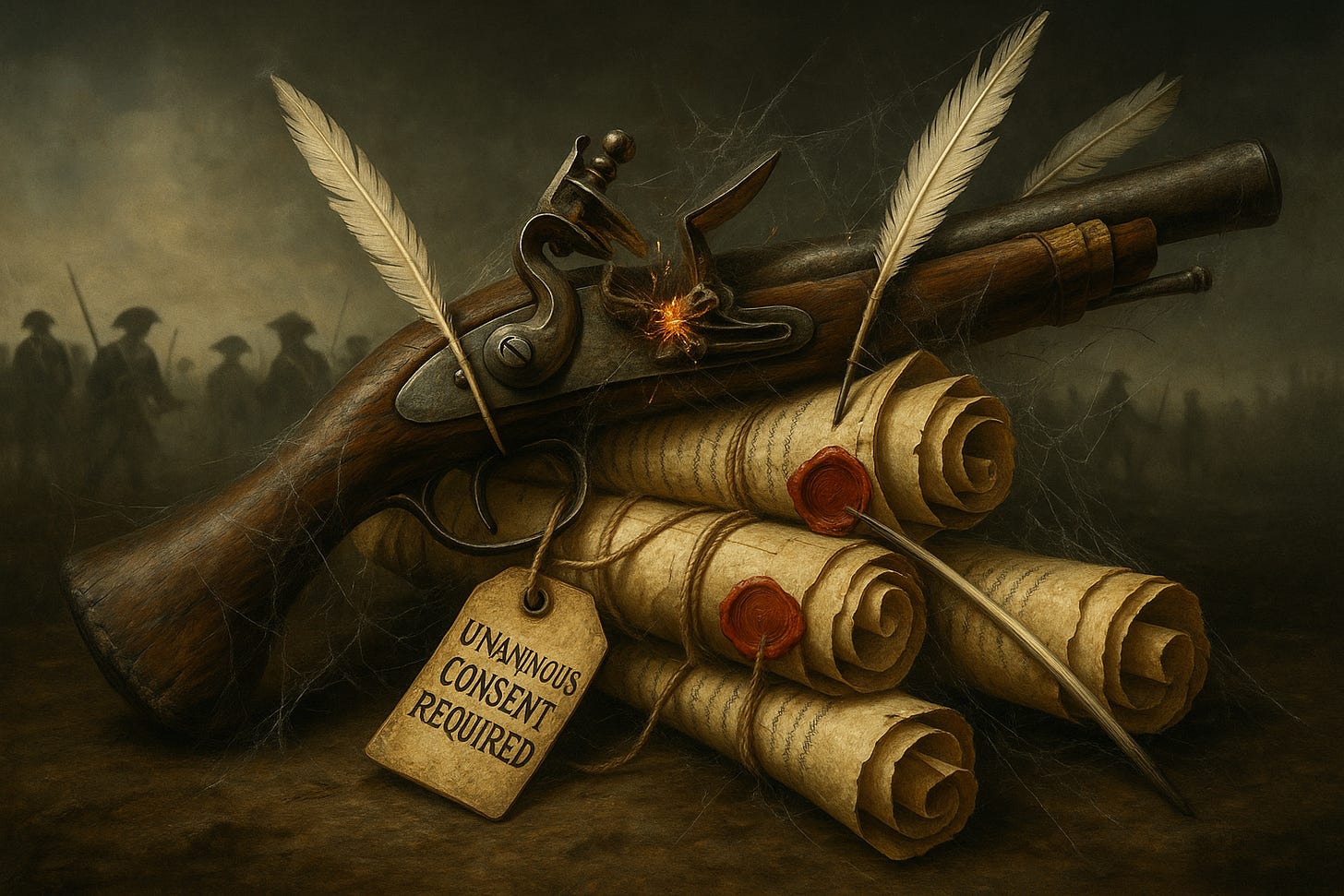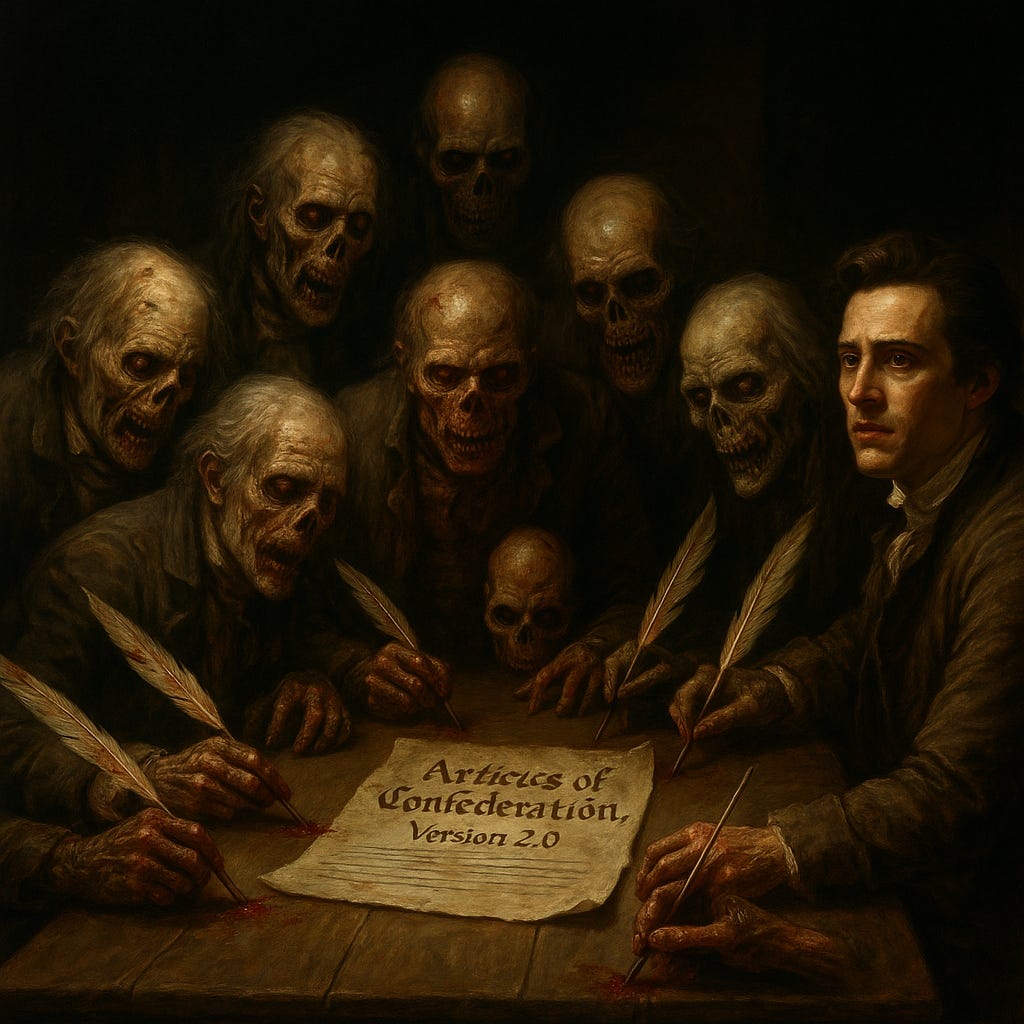The Federalists Reloaded | No. 20
Army of Dysfunction
“In matters where the confederacy was to act, unanimity was indispensable; hence the impossibility of action.” — Hamilton and Madison, Federalist No. 20
Previously on The Federalists Reloaded…
The trilogy began with Greece, a union of proud city-states that spent more time plotting against one another than building anything that lasted. Then came Germany, a confederation so tangled in its own rules that it mistook endless procedure for progress. Now, for the finale, Hamilton and Madison take us to the Dutch Republic, a country so well educated, well-financed, and well-intentioned that it managed to outsmart itself into paralysis.
If Federalists 18 and 19 were Evil Dead and Evil Dead II, then Federalist 20 is Army of Darkness, the part where the horror has gone on so long it becomes absurd. The Dutch did not collapse because they were conquered or corrupted. They collapsed because they could not stop talking long enough to act. The monster in this story is not a tyrant or an invader. It is bureaucracy itself, wearing the polite mask of deliberation.
Act I – The Cabin in the Lowlands
Imagine seven provinces and a dozen major cities locked together in a creaky wooden cabin surrounded by European powers eager to burn it down. Every decision requires unanimous consent. Every disagreement spawns another council. Every council writes another report that nobody reads. Somewhere in that chaos sits a governing body called the States General, trying to run a country through diplomacy, compromise, and a deep commitment to never finishing anything on time.
The Dutch Republic was brilliant in commerce and science, but its politics were a tragic comedy of independence taken too far. Each province guarded its sovereignty like a jealous lover, refusing to share power even in the face of existential threats. The States General could technically declare war, but only after every province gave written approval, a process so slow that battles were often over before the paperwork began.
Hamilton and Madison chose this example for a reason. It was their mirror. Under the Articles of Confederation, America looked uncomfortably familiar: a collection of states that loved liberty but could not agree on how to defend it.
Act II – Possession
In Evil Dead, chaos begins when someone reads from the wrong book. In the Dutch Republic, it began when everyone started reading from their own script. The House of Orange fought to restore hereditary power. The merchant elite wanted stability for trade. The provinces wanted to protect their privileges at any cost. Each group swore they were saving the Republic, and each one was right in theory and wrong in practice.
Hamilton and Madison described how the provinces “continually plundered the general treasury,” a polite eighteenth-century way of saying that local governments kept looting the national budget while blaming others for the shortfall. When foreign armies appeared, the Dutch did not rally; they formed committees. When the country needed defense spending, the rich provinces refused to contribute until everyone else paid first. It was government by spreadsheet and delay.
If that sounds familiar, it should. The same disease spreads through modern alliances and federations. The European Union struggles to act decisively on defense or immigration. NATO still wrestles with members that want protection without paying the bill. American states squabble over borders, infrastructure, and disaster response. The curse is not ideology. It is design. Systems that give everyone a veto eventually teach everyone how to hide behind it.
Act III – The Chainsaw Will Not Start
By this stage of the trilogy, the heroes are exhausted, the walls are closing in, and the chainsaw is out of gas. That is the Dutch Republic in its final century: a government so tangled in its own procedures that it could not save itself even when it saw disaster coming. Hamilton and Madison recounted how provinces sent delegates who were not allowed to vote, how tax payments arrived months late, and how decisions that required unanimity died waiting for one more signature. It was a confederation that mistook stalling for strength.
The Dutch Republic could raise an army only when all seven provinces agreed, which meant that in practice, they rarely had one when it mattered. They debated contributions, troop levels, and jurisdiction while foreign powers crossed their borders. It was like watching a fire department hold a budget meeting while the house burned down.
The comparison is not just historical. Every generation of self-governing people eventually builds its own version of the Dutch Republic: alliances that meet often, talk long, and accomplish little. We rename the committees, trade the wigs for microphones, and call it progress. The machinery of dysfunction just gets sleeker.
Act IV – Hail to the Chief, Baby
By the time Hamilton and Madison reached Federalist 20, they had seen enough. The Greek and German confederations had failed through disunity and weakness, and the Dutch proved that even wealth and sophistication could not save a system built on hesitation. Confederations, they concluded, are zombie governments: dead but still moving, animated by paperwork instead of purpose.
Hamilton captured the absurdity in one line: “The necessity of unanimous consent to the most trivial resolutions has been the cause of numberless embarrassments.” In plain English, when everyone must agree before anything can happen, nothing happens until it is too late. The Constitution they proposed was not a bid for tyranny. It was a plan for survival. They wanted a government capable of action but restrained by accountability, a system that could fight the real monsters without becoming one.
By now, Hamilton and Madison sounded less like founders and more like Ash Williams at the end of Army of Darkness, bruised, sarcastic, and still standing. They had seen what happens when liberty turns into chaos, and they were ready to rebuild from the wreckage. Their Constitution was not a spell of control. It was a chainsaw with a safety switch.
The Moral of the Story
The Army of Dysfunction never really dies. It just rebrands. It gets a logo, a mission statement, and maybe a conference about “stakeholder alignment.” But the disease remains the same: everyone wants a voice, no one wants the burden of choice, and all the good intentions in the world cannot fix a system designed to stall.
Self-government does not fail because people are lazy or corrupt. It fails because indecision feels polite and caution looks like wisdom. A republic survives only when people are willing to make decisions before the walls cave in, not after.
The Sequel Hook
Next time, in Federalist 21, Hamilton stops fighting the undead and starts rebuilding civilization. The chainsaw is fueled, the blueprint is ready, and this time the hero knows better than to trust the committee.
Hail to the Chief, baby.








Thought of you and this series when listening to David Frum's interview of Ken Burns and his new series on the American Revolution. Thank you for the latest chapter!
Superb